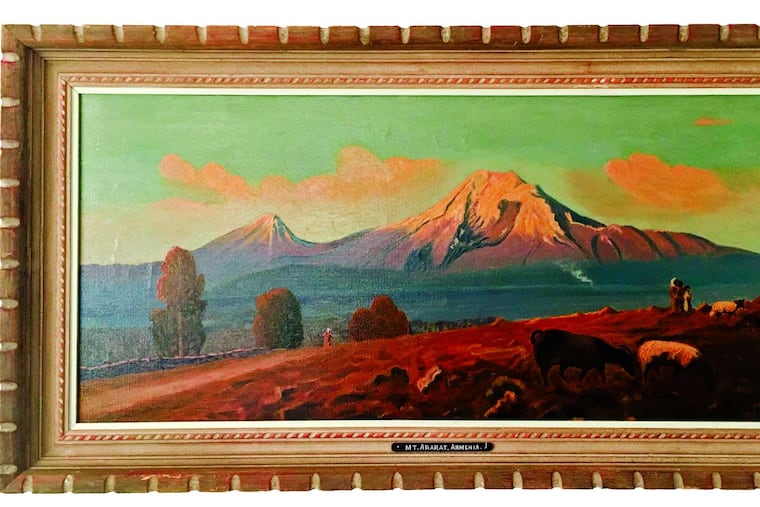Remembering horror of the Armenian Genocide
April 24 is a somber day of remembrance, and should serve as a time of deep reflection. I not only mourn the lost lives of my ancestors, but those of all persons who have been strategically persecuted and massacred.

is a Philadelphia writer
As a descendant of Armenian Genocide survivors, April 24 is a day of great importance to me.
Armenian Genocide Remembrance Day is a time when people from around the world recognize and mourn the more than 1.5 million Armenians who were savagely and systematically exterminated at the hands of the Young Turks during World War I, all in the name of ethnic cleansing.
Historians mark April 24, 1915 - a day known as "Red Sunday" - as the official start of the Armenian Genocide, as it was the day when hundreds of Armenian intellectuals and leaders were rounded up in Constantinople (Istanbul) and later murdered.
Annually, hundreds of thousands of people now visit the Genocide Memorial in Yerevan, the capital of Armenia, to lay flowers at the eternal flame, something I had the opportunity to experience when I was there several years ago.
While April 24 is a somber day of remembrance for those who observe the holiday, it should also serve as a time of deep reflection. For me, it is a day when I not only mourn the lost lives of my ancestors, but those of all persons who have been strategically persecuted and massacred. If anyone cares about a particular holocaust or genocide, then, reasonably, I would hope they should care about all holocausts or genocides.
Interestingly enough, this April 24 is unique, as it overlaps with Holocaust Remembrance Day, which falls on the 27th day of Nisan according to the Hebrew calendar. As many people surprisingly do not know, the Armenian Genocide was essentially the blueprint for the Jewish Holocaust - concentration camps, mass deportations, tattoos, and more. As Hitler is infamously known for saying during his Obersalzberg Speech in 1939, a week before the German invasion of Poland: "Who, after all, speaks today of the annihilation of the Armenians?"
In response to Hitler's question, I am pleased to note that many more people are talking about what happened to the Armenian people. In fact, on Friday, a historical drama film called The Promise was released. It's the first wide-release feature film about the Armenian Genocide. Directed by Terry George and starring Oscar Isaac, Charlotte Le Bon, and Christian Bale, the movie is set in the final years of the Ottoman Empire. It is a must-see for anyone who is interested in history, humanity, and civil rights.
Additionally, I would be remiss if I did not note that April 24 also was the day my paternal great-grandfather - Samuel Abdul Avakian - was born. He was a genocide survivor who hand-wrote everything he knew of our family's history. He recalled the villages where our family first resided between the Tigris and Euphrates Rivers - the "Cradle of Civilization." He shared the origin of our last name, Avakian - Avak means elder/older and ian is son or family of, so Avakian stands for a family having a higher standing in society. And he recounted how family members lost spouses and children during the "massacres and deportations."
Daddy Sam also was a very talented painter. My favorite painting of his is of Mount Ararat. As described in Genesis 8:4, it is where Noah's ark came to rest. Mount Ararat is now in present-day Turkey ("Western Armenia"), but remains a cultural symbol for Armenians worldwide, as Armenia was the first Christian nation.
Although I share the bloodlines and stories of my ancestors, people still ask me why I care so much about what happened more than a century ago. I tell them it is simple; history repeats itself.
Look at what is happening to the Syrian people. Look at Bosnia, Cambodia, Darfur, Rwanda. Look in our own backyards. Where are the Native Americans who once inhabited the places I have called home? How many more of our brown brothers and sisters will be beaten and killed without cause before some people realize that Black Lives Matter is more than a hashtag? Can you imagine how men and women who are undocumented immigrants feel when they hear of deportations, knowing the history of that word? The world is getting more xenophobic and filled with hate, seemingly daily. We are constantly bombarded with news reports of hate crimes. Now is the time to change the narrative.
On this April 24, I challenge you to combat hate with love.
Learn about a culture that is not yours from someone who does not look like you.
Do something nice for a stranger. Random acts of kindness are priceless.
Expand your prayer list, if you are so inclined.
You can do what my friend Dr. Ai Zhang and I did and give out more than 300 hugs to total strangers, just because. It can save lives. Trust me.
Whatever you do this April 24, on behalf of all victims and survivors of the Armenian Genocide, the Jewish Holocaust, and beyond, do something for the betterment of all humanity. Our society is relying on it.